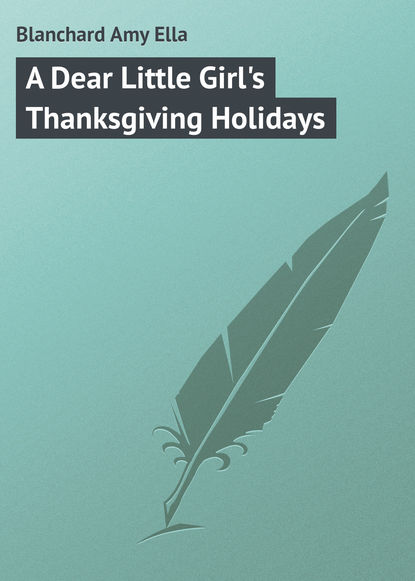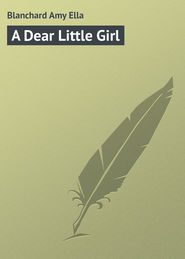По всем вопросам обращайтесь на: info@litportal.ru
(©) 2003-2024.
✖
A Dear Little Girl's Thanksgiving Holidays
Настройки чтения
Размер шрифта
Высота строк
Поля
"Oh, he'll be there; he always is when it is a bright day like this. He sits in an old chair on that broad doorstep in front of his house, and leans on a big, thick stick he always carries."
"Who cooks for him?"
"Oh, he cooks for himself, when he has anything to cook. He has a little garden, but it doesn't amount to much. He has no apple trees except an old one that is nearly dead and never has but a few little, measly, knerly apples on it; that's why I thought he'd like these."
Their walk was carrying them nearer and nearer the old man's door. "There he is now," whispered Esther Ann. "I'll go first and you come right up behind me. Here, take your apple." She thrust the fruit into Edna's hand and hastened her own pace a little. Edna's heart began to beat fast, for surely Nathan Keener was anything but an attractive figure as he sat there glowering and muttering, his gaunt hands resting on his knotted stick, and his grizzly old face wearing a wrathful look.
True to her guns, Esther Arm dashed forward and held out her apple saying in a shrill, excited voice, "Won't you have – "
But she got no further, for with a snarl the old man reached out one long, bony arm and grabbed her by the shoulder, raising his stick threateningly, "I'll larn ye, ye little varmint," he began.
Esther screamed. Edna, paralyzed with fright, looked on with affrighted eyes, but presently found voice to quaver out, "Please don't hurt her! Oh, please don't!"
The other girls a little distance off stood huddled together like a flock of sheep. No one was brave enough to venture within reach of that terrible stick, but just then along came a crowd of boys from school. The foremost took in the situation in a glance, and in another instant was on the platform by Esther's side.
"Here, you old mut, what are you doing to my sister?" he cried, at the same time trying to wrest the stick from the old man's grasp.
But Nathan had too long wielded the stick with effect to lose it so readily. Loosing his hold upon Esther, he swiftly shifted his weapon to his other hand and brought down a blow on the boy's back.
By this time the other boys had come up; there were cries, threats, screams from the girls, shouts from the boys. All was in a dreadful hub-bub when along the road approached a young man who stood for a moment and then dashed to the scene of battle. "Here, boys, here," he cried, "what are you doing to that old man?"
"He was going to beat my sister," spoke up the one who had first hurried to the front.
"You old scalawag," cried the young man, "what were you up to? If you are yearning to hit somebody, take a fellow your own size." He wrenched the stick from the man's grasp and threw it away. "Now," he said, "have it out if you will. I'm ready." He squared off, but the old man had neither strength nor desire to grapple with such a masterful opponent, and he slunk back against his door.
"I guess if your life was pestered by a set of young wretches like these, you'd threaten, too," he said surlily. "I guess I'm getting too smart for their tricks, and know enough not to take anything they offer me. I don't have to have more'n one apple full of red pepper set on my doorsill. I guess I know who hides my loaf of bread, and puts salt in my can of milk. I guess I cut my eyeteeth a good many years ago, and can catch 'em at their tricks."
The young man looked around at the group of boys, now rather shamefaced, at the group of girls now gathered around Esther Ann. On the edge of this latter group he recognized a little round face now tear-stained and affrighted. In a moment he was by Edna's side. "Well, I'll be everlastingly switched," he exclaimed, "Edna, my child, what are you doing in this mix-up?"
"Oh, Ben," returned Edna, "it was all a mistake. Nobody meant to play a trick."
"Come over here and tell me all about it," said Ben, leading her aside. Edna poured forth her tale of woe, during the recital of which more than once Ben's mouth twitched and his eyes grew merry. "It doesn't do to be too zealous, does it?" he said at the close of the story. "Here, old fellow, come back here." He made a dash at old Nathan who was now retreating within his own doorway. Ben pulled him back by his coat-tails. "We aren't through with this yet," he went on as the man turned upon him with a few smothered words. "That isn't a pretty way to talk. You have something of a case, I admit, but you happened to overreach yourself this time. No, you're not going in yet. A little more fresh air won't hurt you. Sit down there and be good and I will tell you a pretty little story." He pushed the old man gently into his chair and stood guard over him. "No, you don't need your stick yet; you might get careless with it. I'll just lean it up against the house. Now, then, those little girls hadn't a notion of playing you a trick; they were trying to do you a kindness. They knew you were lonely and hadn't much chance to run around with the boys, or run an automobile, so they thought they would chirk you up a little by presenting you with a large, sweet, juicy, red apple. Their little hearts were throbbing with good-will; they had an unconquerable desire to bring a smile to your lips and a gleam of happiness to your eye. To prove this to you, I will now dissect this large, sweet, juicy, red apple. I will eat half and you will eat the other. If it isn't a good apple, I'll eat my hat." He carefully cut the apple, which Edna had given him, pared and quartered it, stuck a piece on the end of his knife and offered it to the old man, who pushed it away contemptuously. "Let me insist," Ben went on. "We are not playing Adam and Eve in the garden of Eden. There is no serpent in sight, not so much as a worm, and if you find so much as a grain of red pepper I'll acknowledge myself beaten."
The old man muttered incoherently as Ben finished his harangue, but made no motion to take the apple. "You don't know what you are missing," Ben went on. "Now just for the sake of old times, let's try to be jolly and remember when we were boys. Why, many a time you and I have raced down this shaded street, shouting with mirth, have climbed the wall by the orchard and stuffed our pockets with apples like these. You never could take a joke, as I remember, but still you weren't a bad fellow, and I'll bet you were a wonder at baseball. I shouldn't wonder if your batting didn't beat the town. The way you swing around that stick of yours shows there is 'life in the old land yet.'"
The old man's face had relaxed a little and he no longer muttered under his breath. Ben winked at the boys who had drawn nearer and were enjoying the situation to the utmost. "Now, just for old times' sake," continued Ben, "just tell me what was the last real, good, old-fashioned trick you ever played?" The old man cast a half-suspicious look at the smiling young man by his side, but made no reply. "Too bad you forget," said Ben, "but I'll bet an apple to an oyster you don't forget that last game you played."
"Who told you about it?" snapped out the old man.
"Never mind. Do you suppose such a game as that will ever be forgotten? I'm going to tell these boys all about it some day, see if I don't."
Nathan wheeled around in his chair and glanced over the row of young faces before him. Then he leaned back in his chair and sighed.
"I'll bet you wouldn't mind a good game now, but you've no use for these boys and they haven't much for you. When's the next game, boys?" He turned to the row of faces.
"We've stopped playing baseball for this year," came in a chorus.
"Don't have football up here?"
"No, we haven't any team."
"Too bad. I might join you on that. Well, Mr. Keener, some of these days you and I will go to a game together; we'll get that fixed up. Which of you boys was it who so doughtily sped to the rescue of the young maiden?"
"Jim Tabor; it was his sister the old man was after," piped up the boys.
"All right, and mighty little respect I would have had for him, if he hadn't pitched in the way he did. Step up here, Jim."
Jim came forward, a little awkwardly, the other boys snickering. "Mr. Keener, this is Jim Taber. I want you to look at him and tell me if, when you were a boy of his size you had seen anyone threatening your sister with a stick, you wouldn't have pitched in and fought for her for all you were worth. You weren't any slouch in those days when it came to fighting, I know. That's all, Jim, no apologies necessary. Now, Mr. Keener, there is just one thing more. I don't believe these children are really bad, only mischievous as you used to be when you were a youngster. The girls, I know, are all ready to be friends, bless their dear little hearts. As for the boys, I'll venture to say we can patch up a treaty of peace with them. If you will promise to be a little less free with that stick and not get a grouch on you every time a boy looks your way, they will promise to play no more tricks. If they don't promise, I'll give every mother's son of them Hail Columbia when I come this way again," and by his looks, the boys knew he meant what he said. They were conscious that Ben was standing up for old Nathan, and yet that he meant to be perfectly fair to them. Ben looked up and down the line. "Well?" he said.
The boys looked at one another. "If he'll promise, we will," spoke up Jim Taber.
"It's a go," said Ben. "Now, Mr. Keener, it's up to you."
Old Nathan gave a grunt which might have meant anything, but Ben chose to interpret it his own way. "I think that is meant for assent," he said. "The gentleman seems to be speaking a foreign language to-day, Choctaw, I should say, or maybe Hindostanee. However, it is all right. Now, Mr. Keener, allow me, sir." He opened the door with a flourish and handed the old man his stick. Without a word, Nathan took the stick and went in, Ben bowing and scraping and saying, "Thank you for a very good time," then receiving no reply, not even a grunt, he added, "Not at all, the pleasure is entirely mine." The door closed and that was the end of it.
Edna came running up. "Oh, Ben," she said, "how glad I am to see you. Oh, wasn't it dreadful? How did you happen to come along?"
"Why, Pinky Blooms, I was on my way to grandpa's, thought I would come to take mother back to-morrow, and, as it was a fine afternoon, I concluded, to walk up from the station. Happened by just in the nick of time, didn't I? Funny old curmudgeon, isn't Nathan?"
"Oh, he is terrible," responded Edna, with a remembrance of the uplifted stick. "Are you going home with me?"
"No; you trot along with the rest of the brood; I am going to stay here a few minutes and have a chat with the boys; I'll be along directly."
So Edna left him, the boys crowding around and asking all sorts of questions. Ben was no new figure in the town, and most of them knew him at least by sight. Just what he said to the boys, Edna never knew, but it is a matter of comment that from that day on there were no more tricks played on old Nathan Keener, and though the big stick was not so much in evidence, it was a long time before any of the Elderflowers made any headway in winning even so much as a grunt from him. It was a great setback to the enthusiasm of the girls, but as Reliance told Esther Ann, she should not have tried so venturesome a thing at the very outset. "Mrs. Conway says we should have worked up to it gradually. It's just like training a wild animal, you have to win its confidence first." But Esther Ann declared she wanted no more of Nathan Keener, and Reliance was perfectly welcome to try any methods she liked so long as Esther Ann was not asked to share in the effort. It was a very exciting afternoon, taking it all in all, and was the means of bringing some ridicule and some censure upon the little club. One or two of the girls resigned, saying their mothers did not approve of such proceedings. All this, however, did not happen during Edna's Thanksgiving visit, but she heard of it afterward, and of further matters concerning the Elderflowers.
CHAPTER XI
FAREWELLS
Edna had not finished telling her mother about the afternoon's adventures when Ben came in. The family had gathered in the living-room, Edna sitting on her grandfather's knee, and the others ranged around the big fireplace. "There comes Ben now," Edna sang out, catching sight of her cousin's figure, and running to meet him.
"Halloo, young man," was grandpa's greeting. "I hear you have been having a set-to with Nathan Keener. It isn't the first time that he has had a fisticuffs with a member of this family. He and I used to be continually at it when we were boys together."
"Oh, but isn't he much older than you, grandpa?" said Edna, in surprise. "He looks like a very, very old man."
"And I don't? That's a nice compliment, missy. No, he and I are about of an age, and went to school together in the little, old, red schoolhouse that was burned down some years ago. It is ill health and trouble that makes him look so old, I suppose. Poor old chap, he has lost most of the friends who would have stood by him, for he has taken such an attitude it is impossible to be on good terms with him."
"Ben thinks he used to play baseball," spoke up Edna. "Did they play it so many, many years ago?"
Her grandfather laughed. "They certainly did, and he was tremendous at it. Let me see, forty, fifty years ago isn't so long, and I can well remember the time the Overlea boys beat the Boxtown boys, and it was all because of Nat Keener's good playing. The Boxtown fellows thought all they had to do was to walk in and win, but we gave them a big surprise that day. I remember how we cheered and, after the game was over, carried Nat around the village on our shoulders."
Ben smiled and nodded as if this event came within his recollection, too. Edna looked at him in surprise. "Why, Ben," she said, "you weren't there."
Ben laughed. "No, but I heard about it all years ago, and it came to my mind to-day when I was having it out with Nathan. I'll venture to say he is thinking more of those old times, at this very minute, than he is of his troubles."
"Poor old Nat," grandpa shook his head. "He was as high-spirited a young chap as ever lived, but uncontrolled and always fighting against the pricks. It must be pretty hard for him, pretty hard. He has grown so morose and snappish that no one takes the trouble to do more than nod to him nowadays. He wasn't a bad sort, too free and open-handed, too fond of pleasure, maybe."
"He doesn't have much chance to indulge himself there in these days," remarked grandma.











